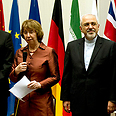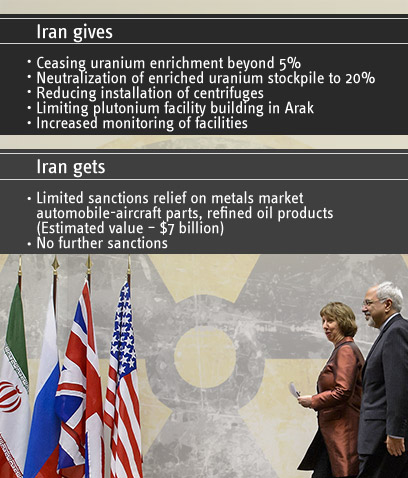
Pros and cons of Geneva deal
Analysis: Greatest danger is that interim agreement will become permanent, leaving Iran as 'threshold country'
But if the reasonable interim agreement turns into a permanent agreement, as Israeli officials fear, it's a bad and even dangerous agreement. It will allow Iran to remain what it is today, "a nuclear threshold country," which can "break through" and acquire material for a nuclear weapon within six to eight weeks.
In the meantime, there isn’t much Israel can do. Netanyahu and Ya'alon must accept the verdict, but the Israeli intelligence will be required to make a double effort in the next six months: Ensure that Iran is not deceiving, and mainly that it is not developing the nuclear weapon itself – in other words, the nuclear explosive device and the warhead – and that the International Atomic Energy Agency inspectors are not cutting corners.
There isn’t much members of the US Senate and House of Representatives can do either. The Geneva agreement – at least on paper – does stop Iran from racing towards the bomb, and so there is no justification for further sanctions at this time. Jerusalem will have to accept that too.
Freezing, not retreating
In the current situation, beyond the "breakthrough" in the uranium path for acquiring material for the bomb, Iran will still require between four months to a year to complete the development of the nuclear explosive device and then the nuclear warhead (a bomb dropped from a plane or a warhead at the top of a missile). So freezing the situation does not prevent Iran from obtaining a nuclear weapon in the future, whenever it wants. What is needed is setting the program several years back.

But the interim agreement signed in Geneva only freezes the situation, in the best-case scenario, and what's worse – it implicitly recognizes Iran's right to enrich uranium on its soil. So Tehran will be able to maintain in the future, after the permanent agreement is signed, abilities and skills in this area which is critical for the development of a nuclear weapon.
There are at least three holes in this Swiss cheese:
The major flaw has to do with the plutonium track. The Iranians are still unwilling to completely halt the construction of the heavy water reactor at Arak, as the French demanded in the previous round of talks. They are only committed to stopping the activity aimed at installing equipment in the reactor under construction, which will allow in the future – in about two-three years – the production of plutonium.
This is a serious flaw because after the construction is completed, the installment of plutonium production equipment in a constructed reactor can be implemented for about six months – and then Iran will have, together with the enrichment abilities it already possesses, a perfect fuel circle which can produce a plutonium-based nuclear weapon.
In addition, when that equipment is brought in and the reactor becomes "hot," it cannot be targeted in a military operation for fear of a Chernobyl-like disaster.
Insignificant commitment
The second flaw has to do with the uranium enrichment track. The Iranians are committing to stop enriching uranium to a 20% level and convert all the quantity they have into fuel rods or uranium oxide (uranium powder). Another commitment is not to increase the amount of uranium enriched to a low level – 3.5% to 5% which they possess.
These restrictions are in fact almost meaningless, as the Iranians have already managed to install nearly 18,000 centrifuges used to enrich uranium. With such an amount of centrifuges, they can enrich uranium to any level they want within a short period of time. At the moment they already have more than 8 tons of uranium enriched to a 3.5-5% level, which is enough for four to five atom bombs of the size dropped on Hiroshima.
So the Iranians can quietly accept the neutralization of their ability to enrich and accumulate uranium at a 20% level. They can skip the stage of enrichment to 20%, and through the centrifuges they have already installed – enrich any amount they want to a level of fissile material.
According to the new agreement, the Iranians are committing not to operate the centrifuges of the new model (IR2M), which are capable of enriching uranium three to four times faster than the old model. They are also committing not to activate centrifuges which have already been installed and are no longer active. In addition, they are committing to limit the number of centrifuges in Natanz by half and the number of centrifuges in Fordo by three-quarters.
These are significant steps from Israel's point of view. It's a very significant achievement for the Americans and French in the Geneva talks – perhaps the most significant achievement.
But Iran already has enough centrifuges of the old model today to make a swift run towards a critical amount of fissile material sufficient for a bomb, even if they don't use the 200 kilograms of 20% enriched uranium they have accumulated and if they don't activate the new centrifuges. So this entire issue is in fact meaningless. Iran is already in the position of a threshold country in terms of its ability to produce fissile material, and this situation won't change. It will just be frozen.
The surprise element
Another serious and concerning flaw in the Geneva agreement is that it does not include an immediate Iranian commitment to uncover the efforts it has made and is still making to develop the explosive device and warhead. As opposed to uranium enrichment, these efforts are taking place in relatively small labs which are easy to hide.
The Iranians are only committing, sometime in six months, to answer questions presented by the IAEA on this matter. During this time, they can complete the development of the nuclear weapon. This is a serious flaw which Western intelligence agencies will have to work hard to overcome in the coming days and months.
The IAEA is demanding access to these camps and answers from the Iranians on the development of the nuclear weapon, but the Iranians are denying that their nuclear program has any military aspect. Until there is no supervision on the Iranian efforts to develop the weapon itself, Iran may surprise the West in spite of the new agreement, just like North Korea has done and is still doing.
It appears that the supervision of the implementation of the freeze agreement will be conducted on an almost daily basis, and will allow unexpected inspections by IAEA staff at the enrichment facilities and at Arak. This is quite satisfactory if it is indeed carried out properly – and this matter belongs to the positive aspect of the interim agreement.
As for the eased sanctions, this is not drastic and it will be possible to re-impose them. On this matter the powers are right when they say that the pressure has not been lifted from the Iranian regime, as the amount of oil it can export and its ability to carry out financial transactions through the banks will remain very limited. So this issue should not really worry Israel or the Saudis.
To sum things up, the problem is that the freeze agreement does not fully guarantee that Iran will not deceive the powers, especially in terms of the construction of the Arak reactor and mainly in terms of the development of the nuclear weapon. But the greatest danger of all is that this agreement will essentially turn into the permanent agreement and leave Iran in the position of a "threshold country" slowly crawling towards the bomb, until one day we will all be surprised.










